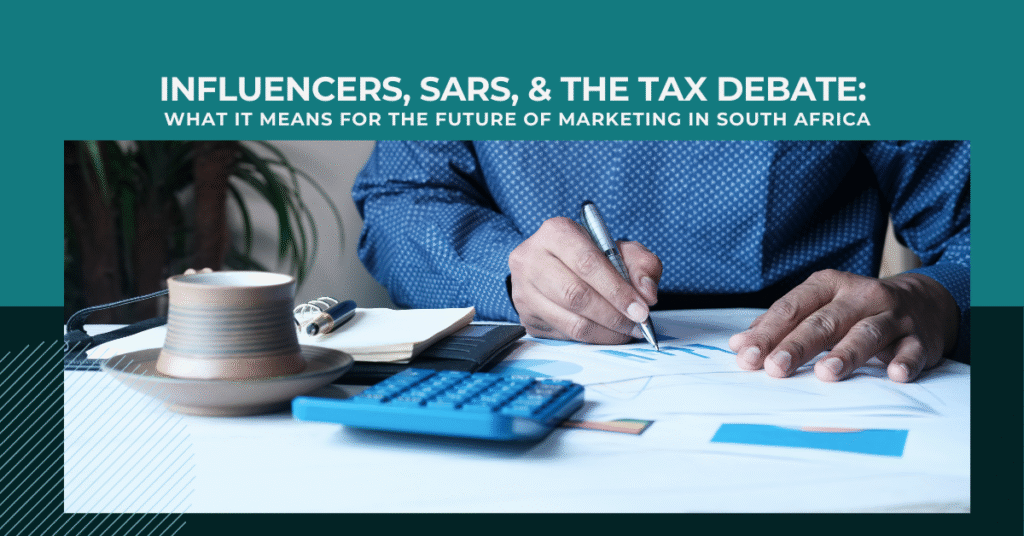For years, influencers in South Africa have been shaping consumer behaviour, commanding audiences, and collaborating with brands in campaigns that rival traditional advertising. But as the influencer economy has grown, so has scrutiny, and now, SARS (South African Revenue Service) has set its sights firmly on this sector. What started as social chatter about “influencer taxes” has snowballed into a heated debate, raising questions about fairness, legitimacy, and the future of influencer marketing in the country.
Why Influencers Are in the Spotlight
At the core of this conversation is the fact that influencers, like any other income earners, are legally required to pay tax on what they make. Whether it’s through paid campaigns, free products, or brand sponsorships, all of these benefits fall under taxable income. Until now, many influencers, particularly micro and mid-tier creators, operated in a grey area, where payments were inconsistent, often “under the table,” and largely invisible to the tax system.
SARS’s recent crackdown is about closing that gap. It signals not only recognition of influencer marketing as a legitimate business but also an effort to regulate what has become a multi-million-rand industry.
The Divided Public Sentiment
The move has sparked polarised reactions. Many influencers argue it feels unfair. They see themselves as creatives hustling in an unpredictable, gig-based economy where payments are often late or inconsistent. For them, taxation feels like an added burden in an already volatile space.
On the other hand, there’s a growing sentiment from the public and even some fellow professionals that it’s about time. For years, influencers have enjoyed perks, freebies, and lucrative collaborations without the same level of accountability that salaried workers face. The argument is simple: if everyone else pays tax, why should influencers be exempt? Some have even framed it as influencers “finally knowing how it feels” to be part of the broader system.
This tension reveals more than just a tax issue. It speaks to how influencers are perceived culturally, as both aspirational figures and, at times, out-of-touch personalities who benefit from privileges not accessible to everyday South Africans.
The Ripple Effect on Influencer Marketing Companies
For influencer marketing companies, this development is a turning point. Agencies that act as the middlemen between brands and creators now face additional responsibilities. Beyond matchmaking and campaign management, they’re increasingly required to guide influencers on compliance and ensure that contracts, invoices, and payments are handled transparently.
Some agencies have already started offering tax guidance, helping creators formalise their earnings and register properly with SARS. Others are revising their payment structures, ensuring clear documentation that reflects taxable income. For the industry, this shift could actually professionalise the space, moving it from an informal, sometimes chaotic ecosystem into a more regulated and respected business model.
However, it also introduces challenges. Smaller influencers who might previously have flown under the radar could struggle with compliance costs or find the barrier to entry higher. Brands and agencies may lean toward working with established influencers who have their financial houses in order, leaving emerging creators at risk of being excluded.
What It Means for the Future
The spotlight from SARS is ultimately a sign that influencer marketing in South Africa has matured. It has grown big enough to attract attention from regulators, and while the transition may be uncomfortable, it marks an important step in legitimising the industry.
Going forward, influencers will need to see themselves less as casual content creators and more as entrepreneurs running small businesses. This means keeping records, tracking income, and working with tax consultants. For marketing companies, it means building trust by offering guidance and ensuring that both clients and creators operate above board.
On a broader level, this moment might actually shift perceptions of influencers. Paying tax is a marker of legitimacy, and while it stings now, it could help influencers be taken more seriously as professionals contributing to the economy.
Final Takeaway
The SARS crackdown has sparked debate, frustration, and even humour, but it’s also ushering in a new era for influencer marketing in South Africa. Influencers can no longer afford to operate in the shadows; they are now recognised as legitimate earners in the creative economy. For the industry, the message is clear: transparency, accountability, and professionalism aren’t optional anymore; they’re the new baseline.
And while influencers may feel singled out today, in the long run, this shift could strengthen their credibility, elevate the industry, and ensure that South African influencer marketing continues to grow with structure and sustainability.




